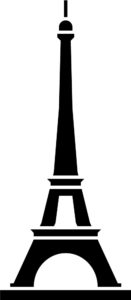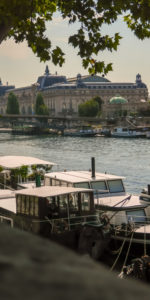The 3rd Paris Conference on Arts & Humanities (PCAH2024)

June 13-17, 2024 | La Maison de la Chimie, Paris, France
 Bienvenue à Paris!
Bienvenue à Paris!
Paris has always been a city driven by strident ideas, where discussions and debates are lively, open and frequently heated, overspilling into protests, strikes and even revolution. As such, the French capital is among the world’s most important cultural and intellectual centers, and a city of great history and energy.
 “Liberty, equality and fraternity” was the 18th century revolutionary call to arms and battle cry that was soon adopted and institutionalised, as the driving motto behind a new country that would throw off the shackles of absolutist aristocratic rule and commit to a new future for the country, based on enlightenment ideals and new understandings. These would have enormous ramifications within France and beyond as the concepts of liberty, equality and fraternity have spread around the world as a slogan, philosophy, aesthetic and political goal. During this period of revolution violence and competing ideologies, radical ideas and ideals around meritocracy and democracy emerged and were implemented in ways that still influence today, from the study, practice and policies of education, and the heuristic that education is for all, to artistic, design, and cultural production.
“Liberty, equality and fraternity” was the 18th century revolutionary call to arms and battle cry that was soon adopted and institutionalised, as the driving motto behind a new country that would throw off the shackles of absolutist aristocratic rule and commit to a new future for the country, based on enlightenment ideals and new understandings. These would have enormous ramifications within France and beyond as the concepts of liberty, equality and fraternity have spread around the world as a slogan, philosophy, aesthetic and political goal. During this period of revolution violence and competing ideologies, radical ideas and ideals around meritocracy and democracy emerged and were implemented in ways that still influence today, from the study, practice and policies of education, and the heuristic that education is for all, to artistic, design, and cultural production.
 Over the course of its history, Paris has been the venue for real and intellectual battles over ideas, ideals and ideologies; between conservative and reformist, secular and religious, multicultural and national, East and West, and all shades of left and right. The French educational system and its fiercely independent, highly vocal, and hugely influential teachers and lecturers are always at the centre of national and indeed international politics and policy. Added to this vigorous public intellectual arena are politicians, writers, journalists, artists, and filmmakers, each bringing a wide variety of perspectives and experience.
Over the course of its history, Paris has been the venue for real and intellectual battles over ideas, ideals and ideologies; between conservative and reformist, secular and religious, multicultural and national, East and West, and all shades of left and right. The French educational system and its fiercely independent, highly vocal, and hugely influential teachers and lecturers are always at the centre of national and indeed international politics and policy. Added to this vigorous public intellectual arena are politicians, writers, journalists, artists, and filmmakers, each bringing a wide variety of perspectives and experience.
What resonates globally, and in this time of globalisation is the openness and rigour of the debates in Paris, and which underlines the continued relevance of this open intellectual space, when in many other places around the world ideas are stifled or banned, any form of opposition is dangerous, and open discussion can be seditious. Paris, city of light, therefore has an enormous and special intellectual place in the heart of all educators and free thinkers regardless of nationality, and especially in today’s uncertain global social-political context.
We look forward to seeing you again, and to your active participation in the event.
PCAH2024 will be held alongside The Paris Conference on Education (PCE2024). Registration for either conference will allow delegates to attend sessions in the other.
– The PCAH/PCE2024 Conference Programme Committee
Dr Grant Black, Chuo University, Japan
Professor Georges Depeyrot, French National Center for Scientific Research (CNRS), France
Dr Joseph Haldane, IAFOR, Japan
Professor Donald Hall, Rochester University, United States
Professor Barbara Lockee, Virginia Tech, United States
Professor Ljiljana Markovic, University of Belgrade, Serbia
Professor Haruko Satoh, Osaka University, Japan
Dr Krisna Uk, Association for Asian Studies (AAS)
- Location & Venue: La Maison de la Chimie, Paris, France
- Dates: Thursday, June 13, 2024 to Monday, June 17, 2024
- Early Bird Abstract Submission Deadline: January 12, 2024*
- Final Abstract Submission Deadline: March 15, 2024
- Registration Deadline for Presenters: April 26, 2024
*Submit early to take advantage of the discounted registration rates. Learn more about our registration options.
About IAFOR
“Inspiring Global Collaborations”
Founded in 2009, The International Academic Forum (IAFOR) is a politically independent non-partisan and non-profit interdisciplinary think tank, conference organiser and publisher dedicated to encouraging interdisciplinary discussion, facilitating intercultural awareness and promoting international exchange, principally through educational interaction and academic research. Based in Japan, its main administrative office is in Nagoya, and its research centre is in the Osaka School of International Public Policy (OSIPP), a graduate school of Osaka University. IAFOR runs research programs and events in Asia, Europe and North America in partnership with universities and think tanks, and has also worked on a number of multi-sector cooperative programs and events, including collaborations with the United Nations and the Government of Japan. Read more about IAFOR.




